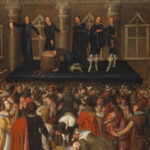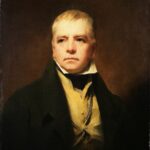David Hume (1711–1776): The Skeptic Who Reshaped Modern Philosophy
David Hume (1711–1776) stands as one of the towering figures of the Scottish Enlightenment and one of the most influential philosophers in Western intellectual history. His empiricism and philosophical skepticism fundamentally reshaped the course of modern philosophy, challenging the rationalist tradition of Descartes and influencing thinkers from Immanuel Kant to Adam Smith. Hume’s insights into human understanding, causation, and morality laid the foundation for the rise of empiricism—the idea that knowledge is derived from sensory experience rather than innate reason. He was a philosopher of radical modesty, constantly probing the limits of human understanding and questioning the grand metaphysical claims of his contemporaries. Yet Hume’s rise was not without resistance. His skepticism toward religious doctrine and his rejection of established philosophical orthodoxy provoked hostility from both the church and the academic establishment. Despite these challenges, Hume’s intellectual influence extended far beyond philosophy. His work helped shape the emerging fields of economics, political science, and psychology, while his historical writings made him one of the most widely read and respected historians of his time. Hume’s legacy endures not only in the history of philosophy but also in the scientific and political principles that underpin modern Western society.
David Hume was born on May 7, 1711, in Edinburgh, Scotland, into a family of moderate wealth and political standing. His father, Joseph Home, was a lawyer, and his mother, Katherine Falconer, came from a family with strong legal and political ties. Hume’s early education was steeped in the intellectual rigor of the Scottish Enlightenment. He attended the prestigious Royal High School in Edinburgh and enrolled at the University of Edinburgh at the age of 12—an astonishingly young age, even by 18th-century standards. Initially, Hume was expected to study law and follow his father’s profession. However, he quickly became disillusioned with legal study and instead immersed himself in the works of classical philosophers, particularly John Locke, Isaac Newton, and Francis Bacon. “Hume’s early exposure to Locke and Newton gave him the intellectual tools to challenge the philosophical orthodoxies of his time,” wrote historian Peter Jones (Jones, 1980).
Hume’s intellectual awakening came in his late teens when he experienced what he described as a “philosophical revelation.” In a letter to a friend, he wrote: “There is a certain boldness in my mind which urges me to form systems of thought, to take nothing for granted, to question all received wisdom.” Between 1734 and 1737, Hume withdrew from public life and immersed himself in an intensive period of study and writing. He settled at Ninewells, the family estate in the Scottish Borders, where he worked tirelessly on what would become his philosophical magnum opus—A Treatise of Human Nature.
The Treatise was published in three volumes between 1739 and 1740. In it, Hume set out to apply the empirical method of Newtonian science to the study of human nature. He argued that human knowledge is not based on rational intuition or metaphysical truths but rather on experience and sensory perception. Hume divided the mind’s contents into two categories: impressions (the immediate data of sense experience) and ideas (the faint mental images of those impressions). From this foundation, Hume built a theory of knowledge that rejected the notion of causation as a metaphysical necessity.
Hume famously argued that our belief in cause and effect is not based on logical certainty but on habit and custom. When we see a billiard ball strike another and watch it move, we assume that the first ball caused the second ball to move—but this assumption is based on repeated observation, not on logical necessity. “There is no impression from which the idea of necessary connection arises,” Hume wrote. “It is nothing but the effect of habit that makes us expect similar outcomes in the future” (A Treatise of Human Nature, 1739). This was a radical and unsettling conclusion, undermining the philosophical foundations of science and metaphysics.
The reception of A Treatise of Human Nature was, in Hume’s words, one of “utter failure.” The work was largely ignored by the philosophical establishment, and the few reviews it received were hostile. Hume himself admitted that he had made a tactical error in his presentation, writing that the work “fell dead-born from the press.” Yet his central arguments—about the nature of human understanding, the problem of causation, and the limits of reason—would later become cornerstones of modern philosophy.
After the disappointing reception of the Treatise, Hume turned to more accessible forms of writing. In 1742, he published the first volume of his Essays, Moral and Political, which were more warmly received. These essays reflected Hume’s interest in political theory, economics, and moral philosophy. In one of his most famous essays, Of the Original Contract, Hume challenged the prevailing theory of social contract, arguing that governments derive their legitimacy not from a hypothetical contract among citizens but from the gradual development of laws and customs over time. His theory of political legitimacy would later influence thinkers such as Edmund Burke and David Ricardo.
Hume’s growing reputation as a political philosopher did not shield him from controversy. His religious skepticism made him a target for both the Scottish church and the academic establishment. In 1745, he was denied a professorship at the University of Edinburgh due to accusations of atheism. Hume’s views on religion were thinly veiled in his writings. In his essay On Miracles (published in An Enquiry Concerning Human Understanding in 1748), Hume argued that miracles were inherently improbable because they violated the uniformity of nature. His conclusion—that belief in miracles was more likely the result of human credulity than divine intervention—was deeply controversial.
Despite these setbacks, Hume’s intellectual standing continued to grow. In 1754, he began work on his monumental History of England, which covered the history of England from the Roman conquest to the Glorious Revolution. The work became a bestseller, establishing Hume as one of the leading historians of his era. His historical writing reflected his philosophical skepticism—he portrayed history as driven more by chance, habit, and human weakness than by moral virtue or divine providence.
By the 1760s, Hume’s reputation had secured him a diplomatic post in Paris, where he became part of the circle of French Enlightenment thinkers, including Voltaire, Diderot, and Rousseau. He formed a particularly close friendship with Jean-Jacques Rousseau—though the relationship ended acrimoniously due to Rousseau’s increasing paranoia. In 1769, Hume retired to Edinburgh, where he continued to write and revise his work.
Hume died in 1776 at the age of 65. His final years were marked by philosophical contentment and personal dignity. He famously composed his own epitaph: “Born 1711, died 1776. Leaving behind him no justification for belief in an afterlife.” His legacy would not take root immediately. His skepticism about causation and human understanding was initially rejected by Immanuel Kant, who later acknowledged that it was Hume’s work that had awakened him from his “dogmatic slumber.”
David Hume’s influence extends far beyond philosophy. His empiricism shaped the development of the scientific method; his skepticism toward religious authority influenced the rise of secular political theory; his theory of moral sentiment influenced Adam Smith’s conception of economic behavior. “Hume was not just a philosopher,” wrote historian Ernest Mossner. “He was a thinker who taught modernity how to think” (Mossner, 1954). His legacy endures not only in the pages of philosophy but in the modern intellectual and political order he helped to create.
References
Jones, P. (1980). Hume’s Philosophical Politics. Cambridge University Press.
Mossner, E.C. (1954). The Life of David Hume. Oxford University Press.
Wright, J.P. (1992). Hume’s Philosophy of the Human Mind. Cambridge University Press.
Popkin, R. (2003). The History of Scepticism: From Savonarola to Bayle. Oxford University Press.





